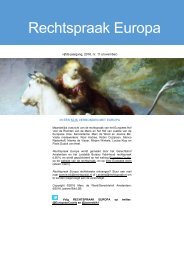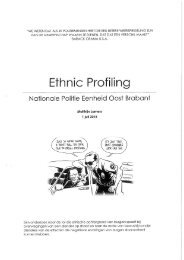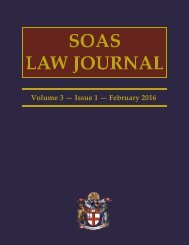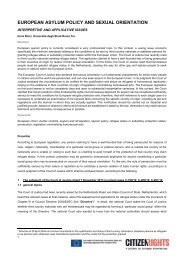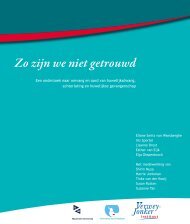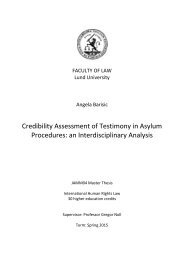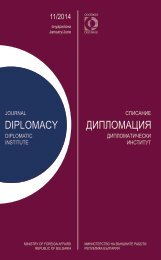AEMI
AEMI-2016-web
AEMI-2016-web
Create successful ePaper yourself
Turn your PDF publications into a flip-book with our unique Google optimized e-Paper software.
Expulsion of Economically Inactive<br />
European Union Citizens 1<br />
Solange Maslowski 2<br />
The freedom of movement and residence<br />
has for a long time been reserved to economically<br />
active persons (workers and<br />
self-employed persons), who represented<br />
a kind of privileged category of nationals<br />
of Member States 3 . Since the establishment<br />
citizenship of the European Union<br />
by the Maastricht Treaty, economically<br />
active and inactive nationals of Member<br />
States henceforth constitute only<br />
one category, the one of Union citizens.<br />
Economically active and inactive Union<br />
citizens enjoy all the rights provided by<br />
Article 20 of the Treaty on the Functioning<br />
of the European Union (hereinafter<br />
‘TFEU’) 4 , the right of freedom of movement<br />
and residence being the first right<br />
mentioned by the article. This right is<br />
moreover enshrined in primary Union<br />
law in Article 21 TFEU 5 and in Article<br />
45 of the EU Charter of Fundamental<br />
Rights 6 . Nevertheless, economically inactive<br />
Union citizens had to wait until<br />
the adoption of Directive 2004/38/EC,<br />
referred to as the Citizenship Directive, 7<br />
to see their right of freedom of movement<br />
associated to the right of mobile<br />
workers in one single instrument. Indeed,<br />
before 2004, Union secondary<br />
law was not only differentiating economically<br />
inactive Union citizens from<br />
workers but also the different categories<br />
of economically inactive Union citizens<br />
between themselves, each category being<br />
dealt with in a different directive 8 . The<br />
number of legal instruments regulating<br />
the freedom of movement of Union citizens<br />
was undermining the clarity and<br />
the legal security of this fundamental<br />
right. The Court of Justice of the European<br />
Union also played a considerable<br />
role in the recognition of the freedom<br />
of movement of economically inactive<br />
Union citizens as its decisions served<br />
as grounds for the writing of Directive<br />
2004/38/EC.<br />
Who are these economically inactive<br />
Union citizens? Taking into account<br />
Article 7 of Directive 2004/38/EC, we<br />
can differentiate two main categories of<br />
economically inactive Union citizens allowed<br />
to reside in host Member States:<br />
- Economically inactive persons who<br />
are self-sufficient and in possession of<br />
sickness insurance coverage, including<br />
pensioners, first-time job seekers 9 and



